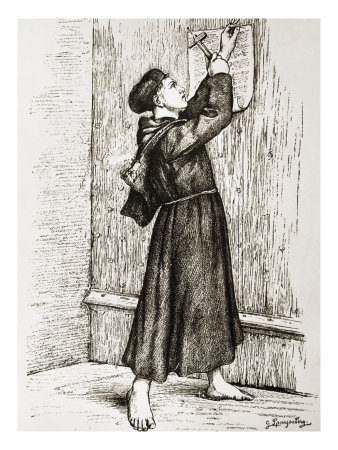
On October 31, 1517 (old calendar) a young priest by the name of Martin Luther nailed his 95 theses to the cathedral door of All Saints Church in Wittenberg in the duchy of Saxony. All over the world, Lutheran churches are paying homage to their founder and many other reformed churches which owe their own existence to this act of defiance.
I was raised Lutheran and I admit that I was not spiritually happy in the Lutheran tradition or what has become Lutheran tradition. So I left and I have no regrets about doing so. The only thing that I do regret is that in my own zealousness and desire for self-justification and self-vindication I have been less than charitable many times towards continued adherents and even converts to the various reformed churches. This does not mean that I cannot engage in debates of substantive concern with regards to Christianity.
Reading some articles today about the Reformation and how churches are celebrating, I came upon an article by Paul McCain, who is a Lutheran pastor and has his own blog, Cyberbrethren. I will admit that I have had several confrontations with him and I will further admit that I do not much care for him personally. His destructive rants against anyone who has left the Lutheran church have damaged the reputations of many good people. I also have some qualms with him on academic integrity, but those are not the issues. On his blog, today, McCain writes what it means to be Lutheran. He writes, "To be Lutheran is to be a person who says, 'This [i.e. Lutheranism] is what God’s Word, the Bible, teaches. This and nothing else is true and correct.'"
His description highlights one of the main reasons why I left Lutheranism. As a Lutheran in catechism class I was taught the three solas: sola fide, sola gratia, sola scriptura. As I studied and read more I found that the last, sola scriptura, was not only historically untenable, it is theologically untenable. Sola Scriptura is also the wrong answer to the wrong question. Lutherans ask "what is the Word of God?" They should ask, instead, "Who is the Word of God?"
The Word of God is NOT the Scriptures. The Word of God is Jesus Christ, the second person of the Holy Trinity who became man. The Scriptures, or Bible, if you prefer, are the witness to Christ. The Scriptures are an icon, an image, of God, but no one would say that they are God. Such a position would be rightly denounced as ridiculous. But the reformed tradition's insistence on sola scriptura replaces Christ as the head of the Church with a book. Catholics go in the other direction and replace Christ as head with their pope. The Lutherans, and other Protestants, did a 180 but are still in error.
This issue was not the driving force behind my leaving, but it is important. I wanted to engage in a practice that fed my soul. I read my histories carefully about the importance of asceticism, fasting, starving the passions, vigilant prayer, worshiping with the Liturgy and offices in the early church, all things which were considered unnecessary by my Lutheran teachers, even condemned because they were not "prescribed in the Bible." Sola Scriptura threw out such good practices and disciplines which I only found and have applied (though poorly) since I became Greek Orthodox. I think that if Lutherans would examine their own history, they would find that the practices I mentioned above were still retained by the Lutheran churches until Pietism in the eighteenth century reared its ugly head.
Luther made some very necessary demands on the church of the west at the time. They were largely ignored and schism ensued, but I think Luther would even have a hard time identifying the Lutheran Church of today (in its thousands of manifestations)as the heir to what he taught. But I know that I could only have become Orthodox if I was Lutheran first. For that, I am very thankful.
